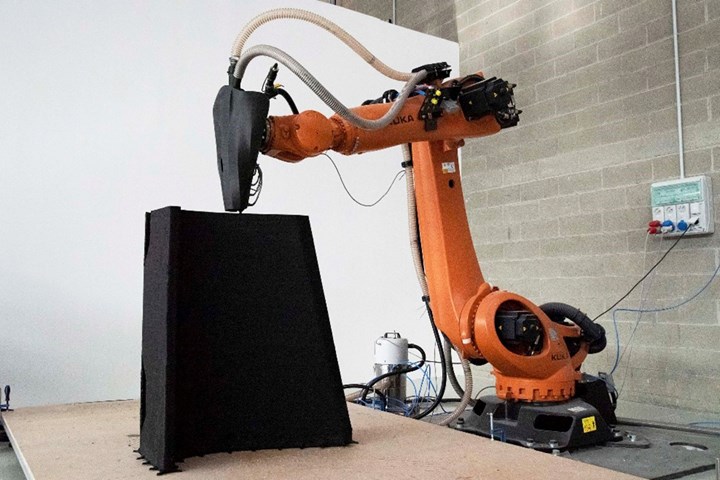Caracol obtains AS/EN 9100 certification for large-scale, robotic-mounted 3D printer
Italy-based large-scale AM specialist secures accreditation to produce aerospace parts. The company is currently scaling up production of various aircraft, launcher and satellite components.

Robotic large-scale additive manufacturing (AM) process. Photo Credit: Caracol
SAI Global (Haymarket, Australia) has certified Caracol (Lomazzo, Italy) and its robotic large-scale additive manufacturing (AM) process for the production of aerospace parts. Caracol claims that it is the first Italian company to secure the AS/EN 9100:2018 standard for this specific technology focus; it has also allowed the company to become part of the IAQG OASIS community of registered companies.
Certification follows several years of joint research with aerospace OEMs and Tier 1 companies, of which Caracol says it has had the opportunity of focusing its work on testing new materials, printing process parameters and different aspects of its robotic AM process.
The evaluation conducted for accreditation analyzed, mapped and developed processes to ensure that the company could guarantee the necessary industry standards. Thanks to the system qualification and materials characterization process, Caracol says it has been able to guarantee parts reliability, repeatability and quality standards in line with AS/EN 9100:2018 strict requirements.
“This achievement is a key milestone in our proprietary robotic large-scale AM system development. We’ve culminated all the research efforts carried out with our aerospace partners over the past few years,” says Francesco De Stefano, CEO and co-founder. “With our RO-LSAM process, aerospace OEMs and Tier 1’s will be able to produce certified and qualified parts, finally being able to push large-scale AM into production of large-scale tooling and finished parts.”
Caracol has been working towards this milestone for several years. Bringing together a patented extrusion head, feeding system and printing head with a proprietary software platform and the use of robotic arms, the company has been capable of manufacturing components with no limits in scale with advanced composite materials. Moreover, this technology is said to provide companies with a solution that saves costs, reduces production lead time and provides environmental savings (e.g., limiting production waste to a minimum, being able to use recycled material and waste).
After manufacturing several significant aerospace components last year— such as the large-scale tooling for aircraft manufacturing and propellant tanks for satellite deployers — and going through different aerospace OEMs product qualification processes, Caracol’s work has been endorsed by the achievement of this certification. With it, the company is currently scaling up the production of various components for aircraft, launcher and satellite manufacturers.
Related Content
-
Composites manufacturing for general aviation aircraft
General aviation, certified and experimental, has increasingly embraced composites over the decades, a path further driven by leveraged innovation in materials and processes and the evolving AAM market.
-
Cryo-compressed hydrogen, the best solution for storage and refueling stations?
Cryomotive’s CRYOGAS solution claims the highest storage density, lowest refueling cost and widest operating range without H2 losses while using one-fifth the carbon fiber required in compressed gas tanks.
-
A new era for ceramic matrix composites
CMC is expanding, with new fiber production in Europe, faster processes and higher temperature materials enabling applications for industry, hypersonics and New Space.
















